Apple Maps, Google Maps and Citymapper Strategy Comparison
November 17, 2017
Update: The interviews with Citymapper went really well, but sadly they’re only looking for designers at the moment. Probably better for me to keep learning how software is made for now. Was awesome talking to them though!
I have an upcoming meeting/interview with Citymapper after sending them my first post so I want to impress them with some sweet product suggestions and features.
Problem is, it’s really tricky to come up with ‘big ideas’ on how to improve the product. Suggesting incremental features like adding the ability for students/seniors to add discounts to their profile or turn by turn navigation isn’t that cool, and they’ve no doubt discussed this stuff/have it on their roadmap.
So instead, I’m going to give an overview/speculation on how the Maps applications of Google, Apple and Citymapper fit in with their wider goals.
If you’re unfamiliar with the apps:
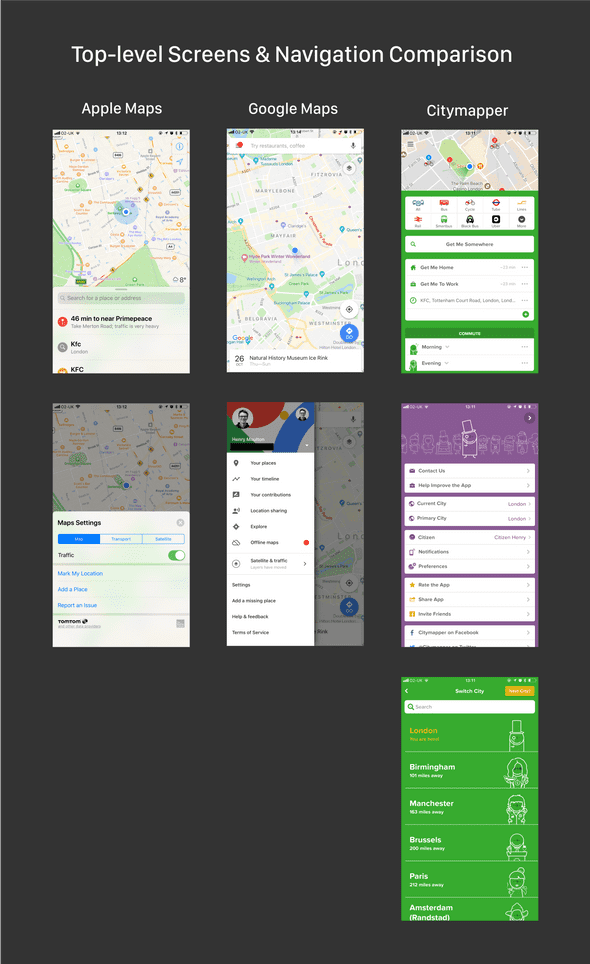 Above: Screenshots of the Apple Maps, Google Maps and Citymapper applications while sitting in a Pret.
Above: Screenshots of the Apple Maps, Google Maps and Citymapper applications while sitting in a Pret.
Off we go.
Google:
How Google Maps fits in with Google’s core strategy:
- Increase Revenue
- Self-Driving Cars
- Maintain Mobile Monopoly
Increase Revenue
- Advertising - Utilise end-user location data to offer them more relevant advertisements, either directly through the Maps platform or in other product platforms; Search, YouTube etc.
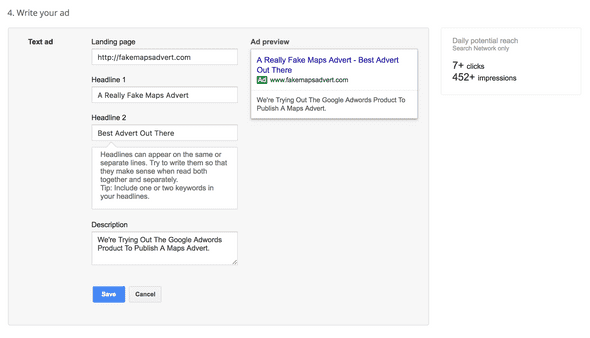 Creating an ad using Google Adwords
Creating an ad using Google Adwords
- API - Sell mapping data through an API. Most businesses can’t create their own Mapping data so leveraging Google’s makes a lot of sense. Customers include Citymapper, DPD, and used to include Uber until they started working on their own mapping. The API also appears in products you might not expect such as a Treadmill that allows you to jog along to Streetview imagery.
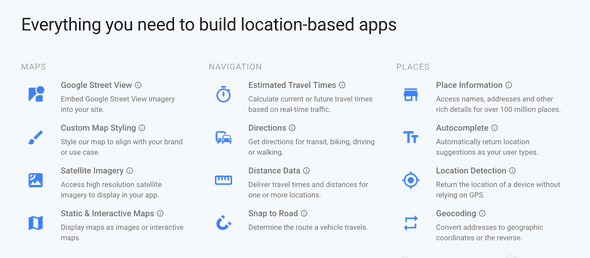 An overview of Google Maps API features
An overview of Google Maps API features
Self-Driving Cars
Google’s spin-off self-driving car company Waymo recently announced that its cars are driving on the road with no one at the wheel:
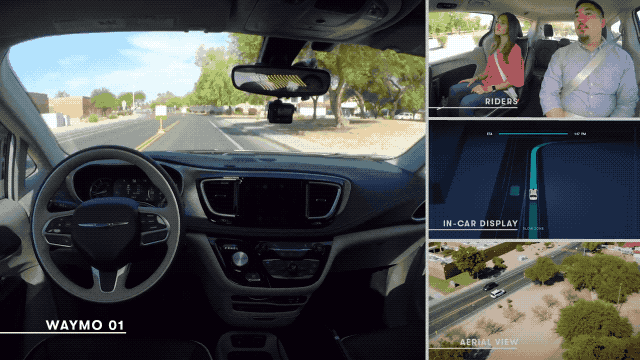 Gif from TechCrunch, Press Release and Video from Waymo
Gif from TechCrunch, Press Release and Video from Waymo
Maps is a core component in the software side of creating a self-driving car and the data that Google collects in the Maps product increases the viability of self-driving cars.
Maintain Mobile Monopoly
Maps is one of the Apps that Google bundles with Android giving it to OEMs as part of their MADA agreement. Bundling the apps together creates a better user experience for end users while creating a lock in which makes it harder for competitors to enter the Mobile market with their own OS. This is one of the reasons Google is the #1 in the smartphone market. It created an OS - Android, and if OEMs want the Play Store (which they do, no smartphone is complete without an app store), they must have the rest of the apps too.
By building better mobile products, Google creates a competitive smartphone experience which gives them more users, allowing them to collect more data, allowing them to improve both their products and increase mobile revenues through increasingly relevant advertising.
The idea here is that Maps is a key component of the smartphone experience and Google will try to weave Maps throughout the rest of the apps on the phone - Phone, Assistant, and Chrome.
Apple
Giving consumers no reason to switch over to another smartphone (powered by Android) is the main goal, therefore creating ‘core’ products on top of the OS like Maps gives Apple more control.
- Increase (iPhone) Revenue
- Develop self-driving car software
Increase (iPhone) Revenue
Apple doesn’t monetise through advertising (well not really). Instead it tends to focus on delivering a flagship smartphone every year with incremental upgrades that consumers will hopefully buy every year or two.
With the iPhone having a profit margin of ~25%, Apple has become the largest company in the world.
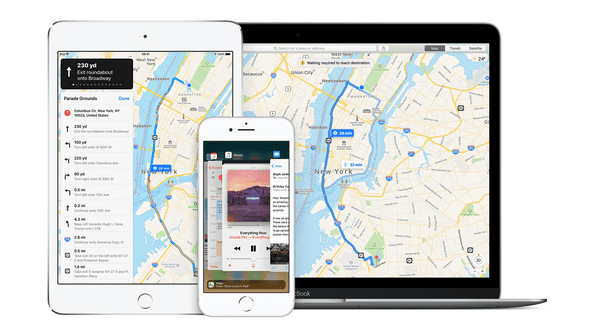 Apple Maps is bundled with all of Apple’s devices
Apple Maps is bundled with all of Apple’s devices
Develop Self-Driving Software
People who are really serious about software should make their own hardware.
The Alan Kay quote that Steve Jobs used in the launch of the 2007 iPhone doesn’t seem to apply to cars.
In an interview with Bloomberg in August 2017 Apple’s CEO Tim Cook said that Apple was “focusing on autonomous systems”.
Perhaps this is because consumers won’t be owning cars, they’ll be hailing them. Because of this there’s less of an incentive for consumers to own a shiny Apple car as a status symbol. Therefore you can’t have tasty 25% profit margins.
If this sounds ridiculous, look to Uber. Uber saw with the launch of UberX, consumers rarely go for more premium modes of transport if you can save money. Here’s an excerpt from the epic 2016 How Uber Conquered London:
No one thought it was a good idea. Howard said something about protecting Uber’s luxury brand. “Travis was like, ‘I don’t care about the brand. If we don’t cannibalise ourselves, someone else will cannibalise us.’”
The rest is history, people have long forgotten that Uber used to be a luxury black car service. The low cost UberX and now Uber Pool have become a staple for mass-market transportation in cities.
Soon they’ll be no money in making (luxury) cars, or as Bob Lutz, former Vice Chairman of General Motors puts it:
Kiss the good times goodbye… These modules won’t be branded Chevrolet, Ford or Toyota. They’ll be branded Uber or Lyft or who-ever else is competing in the market. The era of the human-driven automobile, its repair facilities, its dealerships, the media surrounding it — all will be gone in 20 years.
This is a guy who two years ago said:
“When it comes to actually making cars there is no reason to assume that Apple, with no experience, will suddenly do a better job than General Motors, Ford, Volkswagen, Toyota, or Hyundai. So I think this is going to be a gigantic money pit…” “By the way the electric car market is still miniscule. That just doesn’t make sense.”
But perhaps the main issue of why Apple can’t go and make a car, is that the “Apple of Cars”, a company that makes a winning combination of both hardware and software - is already here:
First they ignore you,
Then they (lie to) laugh at you,
- Top Gear - Tesla Roadster 2008
- Ten Million Electric Miles and Counting: By Jove, It Does Work in the Real World 2011
Then they fight you,
- Nissan Leaf - 2010
- BMW i3 - 2013
Then you win.
In an unlikely but fun to imagine M&A scenario, the combination of Tesla’s precarious finances and overestimating launch dates mean that they’re unable to raise additional debt, causing Apple to buy them with the sack of cash that Apple sits on.
In the meantime, Apple will continue to use their existing mapping data and Maps apps to fuel their self-driving car software ambitions, and the outcomes of research in areas like Computer Vision will find their way back into the iPhone and Apple’s upcoming AR product.
Citymapper
The Citymapper Mission: Make Cities Usable
Focusing on helping people get around cities while reducing congestion and pollution.
Constraints
While Citymapper has it’s own goals, because of it being a startup, it also has constraints.
Data
While Citymapper is able to collect the trip data, they don’t own the underlying map data, Google does. Because of this they use Google’s API to have access to maps, but can’t access features Google Maps has such as turn-by-turn navigation.
To mitigate this as much as possible, Citymapper annotates its datasets with additional information with a product called Batcave.
Man power
Apple has 123,000 employees, Google has 74,000.
LinkedIn says Citymapper has under 50. This means Citymapper can’t throw more employees on a problem, like how Microsoft allocated 5,000 employees to artificial intelligence efforts.
Funding
Unlike Apple and Google that have been around for decades and have mature streams of revenue, Citymapper is a Venture Capital funded startup with $50,000,000 in total funding with $40,000,000 coming in January 2016 during their Series B.
Keeping a steady burn rate to enable multiple years of ‘runway’ to enable them to create the long term business needs to be managed efficiently.
Goals
The problem with $50,000,000 in funding means that Citymapper must aim (or pitch to VCs) for at least a 5-10x return for its investors over a period of 5-10 years.
It’s tricky to understand how to solve the goal of getting to a multi-billion dollar valuation, but necessary due to VCs investing on the premise that startup returns have a power law distribution.
Luckily tech companies can attain these valuations through having a combination of Daily Active Users, user growth, valuable data and a smart team. Revenue is a plus but not a hard requirement.
So with all this funding what’s the long term goal? Here’s what it look like to me?:
Note that this is all speculation from doing my own research.
- Figure out gaps where transport is needed
- Operate Bus Networks (or sell software to Bus Networks?)
- Build City Transport Authority Trust
- ???
- Sell?
Make Smart Decisions using Data
Citymapper has Batcave and Simcity that allow for the creation, annotation and evaluation of Citymapper app data.
The outcome of this data allows them to create needed smartbus and black bus routes.
Operate Bus Networks (or sell software to Bus Networks?)
Transport companies make money, Arriva was bought by Deusche Bahn for £1.59 billion in 2010. Arriva won the £1.5 billion contract in 2016 to operate London Overground. You’ve probably been on one of their London Buses alongside other TFL Bus operators.
Citymapper probably won’t be manufacturing buses anytime soon, nor will it probably operate them (it’s possible but unlikely), but selling it’s software to operators across the world could be an interesting proposition.
Build City Transport Authority Trust
You can’t just go and launch your own bus network if people don’t trust you. Building trust is instrumental.
???
More crazy ideas like a bus network, continually pushing the fold of moving out of being ‘just an app’ and into a modern data-driven transportation company.
Wrapup
A Maps app is now table stakes. But there’s a lot more to play for. It’s going to be interesting watching this one play out.
—
Disclaimer: All of the information and research regarding Citymapper is public knowledge and none of it has been acquired during my conversations with them.
Thanks for reading! If you have any comments, questions or feedback please get in contact. Have a nice Sunday.
I'm Henry Moulton, a software design and development freelancer living in London, UK.
My portfolio will be online soon.